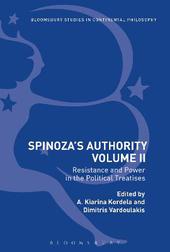
|
Spinoza's Authority Volume II: Resistance and Power in the Political Treatises
Hardback
Main Details
Description
Spinoza's political thought has been subject to a significant revival of interest in recent years. As a response to difficult times, students and scholars have returned to this founding figure of modern philosophy as a means to help reinterpret and rethink the political present. Spinoza's Authority Volume II makes a significant contribution to this ongoing reception and utilization of Spinoza's 1670s Theologico-Political and Political treatises. By taking the concept of authority as an original framework, this books asks: How is authority related to law, memory, and conflict in Spinoza's political thought? What are the social, historical and representational processes that produce authority and resistance? And what are the conditions of effective resistance? Spinoza's Authority Volume II features a roster of internationally established theorists of Spinoza's work, and covers key elements of Spinoza's political philosophy.
Author Biography
A. Kiarina Kordela is Professor of German and Director of the Critical Theory Program, at Macalester College, and honorary adjunct professor at the University of Western Sydney, Australia. Dimitris Vardoulakis is Associate Professor in Philosophy at the University of Western Sydney, Australia.
ReviewsThe two volumes of Spinoza's Authority have a great deal to offer students and working scholars alike. They contribute to the continental tradition of the interpretation of Spinoza, and they also describe Spinozism as an approach to current social and political issues. * Notre Dame Philosophical Reviews * One of the most decisive political and philosophical questions of our age is that of power. What is real power? Who holds power? What can be done with power? And what are its limits? The essays of this volume provide new resources for addressing the problem of power today. Their wager is that Spinoza's understanding of authority may help break free from the sad passions of today's politics and thinking. Through an unflinching analysis of authority we may begin to articulate an ethics of power. * Anthony Paul Smith, Assistant Professor of Religion and Theology, LaSalle University, USA * This rich collection of papers shows the importance of Spinoza's political writings for the themes of authority, power, law, and freedom. I cannot imagine a better introduction to his philosophy. It should pique the interest of every student of modern political philosophy. * Steven Smith, Alfred Cowles Professor of Government & Philosophy, Yale University, USA *
|